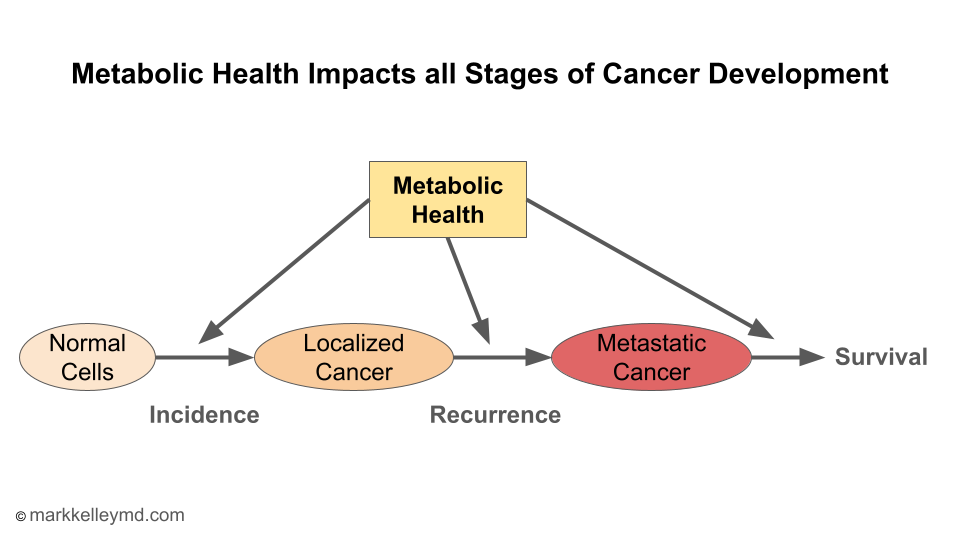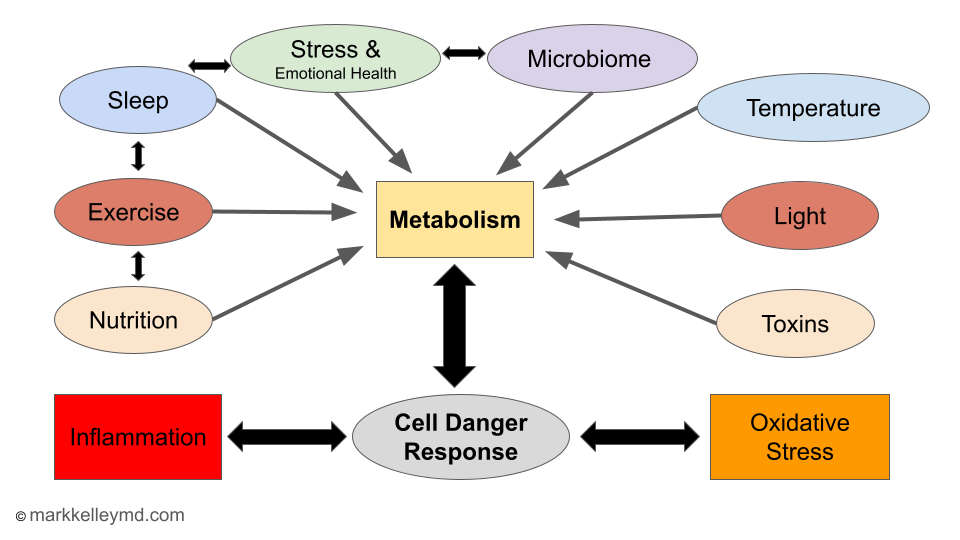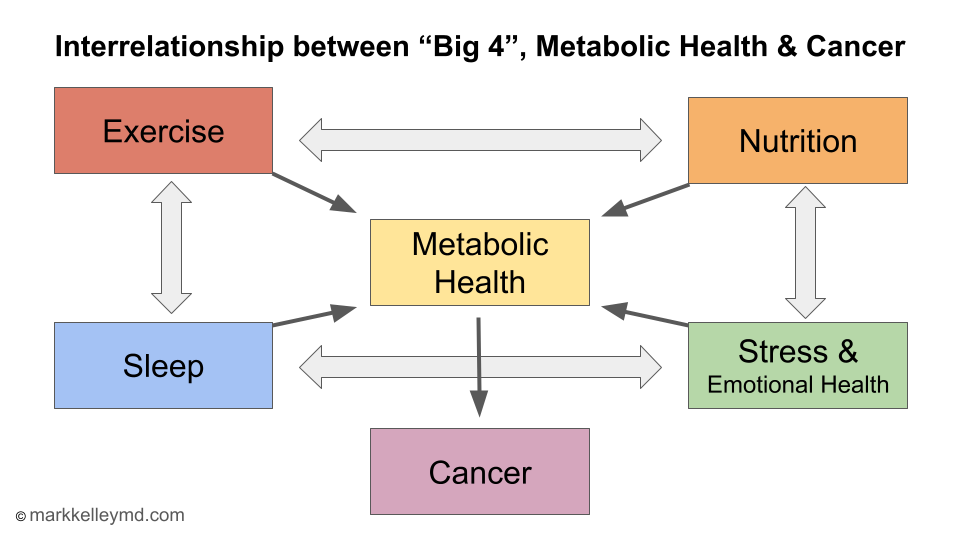The importance of metabolism to health cannot be overstated. Metabolism is the foundation of ALL aspects of health. Take a minute to think about this. Metabolic health IS health. You are not healthy if your body is not metabolically healthy. Poor metabolic health is a root cause for most chronic diseases, including cardiovascular disease, cancer, and neurodegenerative disease responsible for over 80% of all deaths in modern societies. Improving your metabolic health will dramatically decrease the risk of all common chronic diseases, including cancer. Focusing on metabolic health is the key to improving health outcomes for most chronic diseases. Unfortunately, modern Western medicine has not been effective at providing the knowledge and tools to improve our metabolic health. Better solutions are needed and that is what I am working to provide here.
The goal of this portion of my website is to help you understand metabolism, metabolic health and their relationship to cancer. We will review the evidence that metabolic health impacts all stages of cancer development and progression, as summarized in figure 1. I am seeking to provide you with the knowledge and tools to make lifestyle changes that improve your metabolic health and reduce the risk of cancer. This can include reducing the risk of cancer developing or coming back. The great news is that the metabolic changes that reduce cancer risk also improve general health and wellbeing, functional status, quality of life, longevity and health span.
 Figure 1: Impact of metabolic health on cancer development and progression
Figure 1: Impact of metabolic health on cancer development and progression
We will start our journey with an overview of metabolism and metabolic health. This will form the basis for a discussion of the major lifestyle factors that determine metabolic health:
I will highlight the relationship between these Big Four lifestyle factors and cancer and the biological mechanisms underlying them. This will lead us to a series of practical strategies to improve your metabolic health and measure the results. Once we’ve covered this, we will be ready to explore new topics in metabolic oncology in more depth. The long term goal of my site is to continually provide you with the most updated knowledge and tools to help you work with your healthcare team to make positive, sustainable changes that will reduce the risk of cancer. Let’s get started!
Metabolism
Metabolism is how your body converts food into energy to maintain health and function. Eating well, exercising, getting good sleep, and managing stress can help your body’s energy systems run smoothly, while long-term problems with these systems can lead to inflammation and increase your risk of diseases like cancer.
Metabolism can be a very difficult concept to understand. To grasp the relationship between it and cancer, we will need to do a short refresher course in biology. It may have been a long time since high school, but hang in there with me and I will do my best to make it understandable for all of the non medical folks!
The term metabolism describes the complex and interrelated processes that the body uses to maintain the function of its cells, tissues and organs. The most fundamental part of metabolism is the way the body uses energy. We provide energy to our body through food, and the body uses this energy to perform all of its functions. One way to imagine this is to consider the body to be a large city. The energy required to run the city is produced in a power plant from a fuel source such as coal, oil or the sun. This energy is then distributed to all parts of the city so people can do their jobs. In the body, the “fuel” is food, the “power plant” is called the mitochondria, and the “people” are the cells. When the fuel supply matches the needs of the body, it functions well, and is in energy balance, or homeostasis. When there is excess energy, the body can use a small amount of it to build new cells and tissues, but most has to be stored. Over time, the body runs out of places to store energy and this begins to affect the function of cells and tissues. This state of imbalance is called metabolic dysfunction, or poor metabolic health.
Going back to our analogy, Nutrition is the amount and type of fuel that the city receives. Some fuels (e.g. solar energy) are “cleaner” (healthier) than others (e.g. coal) and do less damage to the “environment” of the body. Exercise increases the amount of energy used by the body and makes the “power plants” (mitochondria) more efficient at converting food into energy. Sleep is the maintenance system of the body that repairs problems with the “power plants” and systems that distribute energy throughout the body. Chronic Stress damages the “power plants” and the distribution system. All of these factors work together to determine how effectively energy can be produced and distributed throughout the body and how well the cells, tissues and organs function. When there is an adequate supply of energy and “building blocks” (protein), the body can make new cells and tissues. This is called anabolism. When there is insufficient energy or “building blocks” the body breaks down existing cells and tissues. This is called catabolism.
Mitochondria and the cell danger response
How are these aspects of metabolism all linked together? It turns out that the “power plants” are the key. As we discussed, metabolism describes the processes that the body uses to convert the energy in food into energy that can be used by cells. This energy conversion occurs in mitochondria, which are the “power plant” of the cell. When mitochondria become less effective, the ability of cells to produce energy decreases. “Underpowered” cells cannot perform their function and transmit “danger signals” to other cells. The danger signals increase inflammation and oxidative stress, which causes damage to other normal cells. This is a root cause for many chronic diseases, including cancer.
An important insight is that mitochondria are both “power houses” and “danger sensors” for the cells. They continuously sense environmental changes and threats and respond by changing their metabolism. These “threats” may be physical (e.g. infection or trauma), environmental (nutrition, exercise, toxins, temperature or light) or psychological (stress and anxiety). These “threats” lead to activation of the cell danger response which increases inflammation and oxidative stress. If the danger response resolves quickly, the cells can become healthier and more resistant to other threats in the future. If the danger response persists, cellular damage and chronic disease develops. Reducing environmental factors that activate the mitochondrial danger response will improve the ability of cells to generate energy, reduce damage to other cells through inflammation and oxidative stress, and reduce the risk of developing chronic diseases, including cancer. The key features of the cell danger response as summarized in figure 2.
 Figure 2: Key features of the cell danger response
Figure 2: Key features of the cell danger response
Metabolic Health
Metabolic health is how well your body manages energy, especially blood sugar. Poor metabolic health can increase your risk of cancer and make treatments less effective.
Metabolic health describes a situation where energy intake is balanced to the needs of the body. The most important aspect of metabolic health is the ability of the body to regulate the level of glucose, or blood sugar. Glucose is the primary fuel source for most cells, including cancer. When the body is healthy, the level of glucose in the blood is maintained in a narrow range because it is taken up and used efficiently by cells. When glucose metabolism becomes abnormal, glucose levels begin to rise. This decreases the health and function of many organs and tissues in the body. Poor metabolic health is also reflected in the level of other metabolites such as lipids (triglycerides and cholesterol), blood pressure, and fat accumulation. When these changes become more severe, a condition called metabolic syndrome develops. The criteria for metabolic syndrome are listed below. When three or more of these factors are abnormal, metabolic syndrome is present. Individuals with metabolic syndrome have a higher risk of most chronic diseases, including cancer.
Criteria for Metabolic Syndrome:
- Fasting glucose > 100
- Fasting Triglycerides > 150
- HDL cholesterol < 50 (women); < 40 (men)
- Waist circumference > 35 in (women); > 40 in (men)
- Blood pressure > 135/85
Most issues with metabolic health that impact cancer risk are related to energy balance. We all require a certain amount of energy to meet our body’s needs. This is a combination of the energy we use to run the body at rest, called the resting energy requirement, and any additional energy we expend through exercise or heat generation. This energy is measured in kilocalories, commonly referred to as calories. If the amount of energy taken in is greater than the energy used, there is an energy surplus. The body stores this extra energy, leading to weight gain and obesity. Over time, if there is a significant energy surplus, the ability of the body to take up and use the extra energy becomes limited. This occurs through a process called insulin resistance, where the ability of the body to remove glucose from the bloodstream in response to insulin decreases. This leads to elevated fasting blood glucose levels. Insulin resistance is also called prediabetes. As the process progresses, glucose levels rise further, and type II diabetes develops. Obesity, insulin resistance, and diabetes are all associated with an increased risk of developing cancer, a lower response to treatment, and poorer long term survival.
There are many other aspects of metabolic health beyond glucose metabolism. These include:
- the ability to produce and use energy from different fuels (metabolic flexibility);
- the efficiency of energy production from nutrients by the mitochondria (aerobic efficiency);
- the ability of the body to deliver oxygen to cells (aerobic capacity);
- the health of cells lining blood vessels (endothelial function);
- and the health of the cells lining the intestine (gut health).
The health and function of the gut lining is regulated by the bacteria living in the intestine, called the intestinal microbiome. Gut health affects metabolism and immune function throughout the body and is now recognized as a critically important factor in all aspects of health, including cancer.
Immune Function
Your immune system protects your body from harm, including cancer. Poor metabolic health can weaken your immune system, potentially increasing your cancer risk.
The immune system is a complex network of organs, cells, proteins and chemicals that work together to defend the body. It has many functions, including protection from and response to infections, recognition and repair of injured tissues, monitoring and control of cancer. The immune system regulates inflammation and oxidative stress resulting from cell danger signals. This can be very beneficial when the body is responding to infection or trauma, but can cause cell damage and chronic disease when it occurs over a long period of time.
The two major components of the immune system are white blood cells (leukocytes) and antibodies. Antibodies are proteins that recognize and neutralize things that damage the body such as bacteria and viruses. They are found in body fluids and are called the humoral immune system. White blood cells make up the cellular immune system. There are many different types of white blood cells that perform different functions in the immune system. These include neutrophils, macrophages, dendritic cells, and lymphocytes. Lymphocytes are divided into B cells and T cells. B cells produce antibodies. T cells can attack cells that are a threat to the body or regulate the function of other immune cells. The humoral and cellular immune systems work together to defend the body, and different cells and antibodies are involved in the response to different types of threats.
It is critically important for the immune system to recognize and respond to infections and other threats to the body, but not to normal cells. An abnormal immune attack on normal cells is called an “autoimmune” response, and can lead to organ damage and disease. Poor metabolic health is associated with impaired immune regulation and autoimmune disease. When immune function declines, the body cannot respond to infections and other challenges. This is called immunosuppression, or immune dysfunction, and can result from aging, poor nutrition, medications and poor metabolic health. Immunosuppression increases the risk of many cancers, highlighting the link between metabolic health, immune function and cancer.
Inflammation
Inflammation is your body’s response to threats, but ongoing (chronic) inflammation can be harmful and increase cancer risk. Improving metabolic health can help reduce long-lasting inflammation
When the immune system senses a danger signal, white blood cells release chemicals that activate the immune system and help repair damage. These chemicals are called cytokines, and they trigger an inflammatory response, or inflammation. An acute inflammatory response can be beneficial in infection or trauma, where it helps the body rid itself of infection and heal the injury. Once the infection or injury has resolved, inflammation should decrease. When the inflammatory process persists, chronic inflammation has developed. Chronic inflammation is associated with many diseases including cardiovascular disease, neurodegenerative disease, and cancer. Poor metabolic health increases inflammation in several ways, and conversely, chronic inflammation impairs metabolic health. The good news is that many factors that improve metabolic health also decrease inflammation. Improving multiple factors that impact metabolic health and immune function can have an additive effect to improve health and reduce cancer risk.
Oxidative Stress
Oxidative stress happens when your body can’t neutralize harmful substances, which can damage cells. Good metabolic health helps your body fight this damage.
Reactive oxygen species or free radicals are produced in the body after exposure to a variety of toxins including smoking, alcohol, food additives, air pollution, pesticides, radiation and some medications, including chemotherapy. These chemicals can damage cells through oxidation. The body has a natural antioxidant system to neutralize these substances. The activity of the antioxidant system is decreased by poor metabolic health and poor nutrition. The system can be overwhelmed by repeated exposure to these substances over time. Oxidative stress refers to the net effect of reactive oxygen species in our body. Oxidative damage occurs when there is an imbalance in the production of reactive oxygen species and the availability of antioxidants which leads to cellular injury and organ damage.
Metabolic Health, Immune Function, and Cancer
Poor metabolic health and a weakened immune system can increase cancer risk and affect treatment outcomes. Improving these factors can help reduce cancer risk and potentially improve treatment results.
Poor metabolic health, immune dysregulation, chronic inflammation and oxidative stress are all strongly linked to the risk of developing cancer. They are also associated with the response to treatment, risk of recurrence and survival. There is a strong link between markers of poor metabolic health including obesity, diabetes mellitus, insulin resistance and cancer. Impaired immune function and chronic inflammatory disorders are associated with cancer along with many toxins and chemicals that produce oxidative stress. These factors interact with one another to amplify cancer risk. For example, poor metabolic health impairs the immune system and increases inflammation. Immune dysfunction alters glucose metabolism and increases inflammation. Chronic inflammation inhibits glucose metabolism and immune function. Oxidative damage impairs metabolism and the immune system and amplifies inflammation. Interventions that improve metabolic health and immune function, reduce inflammation and oxidative stress will have an additive or synergistic effect on cancer outcomes. The great news is that the most effective way to improve metabolic health is through optimizing “lifestyle factors” such as nutrition, exercise, sleep, stress and emotional health. Improvements in these “big 4” factors are additive and work together to improve metabolic health and reduce cancer risk (figure 3). The focus of this site is to help you learn what changes can improve your metabolic health, and how to make them.
 Figure 3: Interrelationship between “Big 4”, Metabolic Health & Cancer
Figure 3: Interrelationship between “Big 4”, Metabolic Health & Cancer
